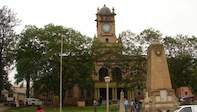Origins of Mthatha
The town of Mthatha was founded in 1879 under the name Umtata, and was declared the capital of the Transkei (Wild Coast), known as the homeland of the Xhosa people. Mthatha developed around the settlement founded on the river's south bank in 1871.

The Paramount Chief of Thembu, Ngangelizwe, granted land to a group of white settlers to act as a buffer against attacks by the Pondo living north of the river.
The settlement expanded steadily after the Anglican Church founded a mission, and an influx of traders and a group of Voortrekkers also swelled the number of inhabitants. Mthatha became the administrative centre of the General Council for the Transkeian Territories, established in 1902 to combine the various territorial councils under a single authority.
Although the name was already in existence in 1688, there are several explanations for its origin. It was said that the name comes from the abundance of umThathi trees, or sneezewood, growing along the river where the town was declared. Another explanation is that the name is derived from the custom of the Thembu people to place their dead in the river.
The bodies were cast into the river with the words 'mThathe Bawo' (take them, Father), and it has been suggested that the noun 'Mthatha' was evolved to name the river.
Mthatha is the largest town in the Wild Coast region and is quite a central place. Among the places of interest in town are the dome-shaped Bunga, which served as the Transkeian 'parliament' for over 50 years, and the sandstone Town Hall, built in 1908.
The mounted cannon in front of the Town Hall is one of several salvaged from the famed wreck of the Grosvenor, which ran aground south of the Msikaba River on the night of 2 August 1782.